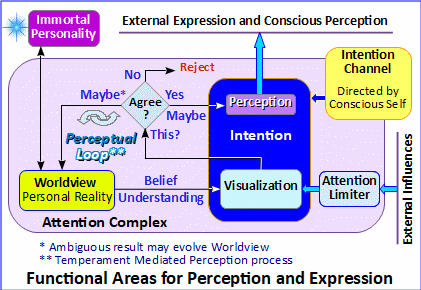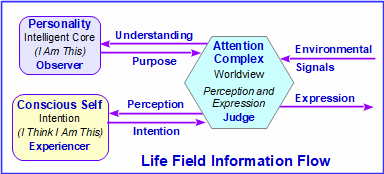
Based on a Flammarion Engraving. Button is from pixabay, user: geralt
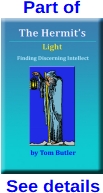 Creative Commons Attribution-Noncommercial-Share Alike 3.0 Unported Licens
Creative Commons Attribution-Noncommercial-Share Alike 3.0 Unported Licens
It is for me to explain what I have learned.
It is for you to ask questions and offer your perspective.
It is for us to further this understanding.
Contents
Introduction
The Importance of Standardized Nomenclature
Etheric
Etheric as the Life Field
Psi Field
Kinds of Science
Physical Science
Social and behavioral sciences (Psychology)
Consciousness Studies
Dualism
Points of View
Two-Mind Hypothesis
Immortal Personality-Centric Perspective
Teaching the Judge
Temperament Mediated Perception
Etheric Studies is a Third Way for Science
Survival-Related Schools of Thought in Parapsychology
Etheric Studies
Scope of Etheric Studies
Who Studies the Etheric?
Consciousness Studies
Potentially Useful Papers
References
Introduction
People who seek to understand their spiritual nature, the nature of reality and their relationship with reality, can be thought of as seekers. Study of the nature of reality is generally known as metaphysics; however, one should not say “metaphysics” without indicating the realm one is interested in. For instance, the mainstream view of metaphysics is that it is the study of nature from a physical-centric perspective.
Metaphysics is often associated with the musing of ancient thinkers such as Socrates and Plato. In that case, the study of metaphysics is typically treated as being synonymous with the study of philosophy. I have made several efforts to involve people who intellectually associate themselves with philosophy in discussions about etheric metaphysics with little success. This is one of the reasons I have branched off with the Etheric Studies.
People become seekers because they have a sense that they are more than their physical body. Exploring that sense typically leads to an understanding that reality has physical and nonphysical aspects. It is useful to refer to this view as Strict Dualism. That is, while Physical Dualism may allow for a sort of virtual space that emerges from the physical, Strict Dualism requires that reality consists of a nonphysical aspect that is primary and an emergent physical aspect that is derived from the primary.
This paper explains the logic in using Etheric Studies as a term to identify the metaphysical study of reality from the perspective of Strict Dualism.
The Importance of Standardized Nomenclature
The ability to communicate abstract ideas depends on the availability of terms that have widely accepted meaning. The academic community claims the responsibility for establishing that meaning but has not done well in establishing consensus definitions in paranormal and consciousness-related terms.
An example of different intended meaning is the use of the term Psi. The Parapsychological Association (20) defines Psi as “A general blanket term … used either as a noun or adjective to identify paranormal processes and paranormal causation.” As the term is commonly used, it may be taken to mean thought, perception of thought or the expression of thought.
Psychokinesis is also a parapsychological term meaning “influence of mind,” but it is used in terms of a force, or more often, the physical effect of expression. When describing the trans-etheric influence of intention, it seems more correct to define Psi as the influence of thought. For instance, the influence of thought to produce a physical effect can be worded as a Psi influence producing intended order.
Having consistently used, widely understood terminology is essential for the community to mature as a culture. Terms like etheric. Psi, consciousness, intention and attention are the coin of metaphysics. The challenge is to develop consensus acceptance and understanding of such terms. In a practical sense, the lay part of our community can only encourage use of terminology. It is for the academic part of our community to lead the way.
Etheric
First, it is necessary to explain why I am using etheric to describe the greater reality. I know this because you might be surprised at how many well-educated people think etheric is a term used only by New Agers, mystics and astrologers. I suspect that everything I say after mentioning etheric to such intellectuals is discounted as New Ager mysticism.
According to Gale Encyclopedia of Occultism & Parapsychology, (1) Ether is:
Late nineteenth-century hypothesis suggested by physicists as a means of accounting for the propagation of light as a wave motion through otherwise empty space. The idea of ether meshed with the teachings of the mesmerists and Theosophists, who spoke of subtle substructures of matter sometimes referred to as koilon—all-pervading, filling all space, and interpenetrating all matter. (Page 520)
Ether is defined in the WordWeb Dictionary as: (2)
- Any of a class of organic compounds that have two hydrocarbon groups linked by an oxygen atom
- A medium that was once supposed to fill all space and to support the propagation of electromagnetic waves
- A colorless volatile highly inflammable liquid formerly used as an inhalation anesthetic
- [archaic] The fifth and highest element after air and earth and fire and water; was believed to be the substance composing all heavenly bodies
WordWeb definitions two and four are most applicable, but with modifications. Be mindful of the difference between body-centric perspective (experiencing the world as if you are your human) and immortal personality-centric perspective (experiencing the world through the eyes of your avatar while maintaining a nonphysical point of view). With that in mind, the WordWeb definitions are written from the body-centric perspective. Definition #2 is correct if we substitute “thought” for “electromagnetic waves.” Definition 4 is correct except that the etheric is not an element. More correctly, elements are treated in metaphysics as the expression of thought.
Etheric as the Reality Field
A field is defined here as a set of elements with related characteristics which are bound into a system by a common influence (the attractor). In metaphysics, a field is bound by the extent of influence the attractor is able to exert. Also in metaphysics, fields are not located by coordinates. Instead, they are located by association with other fields. See the Etheric Fields Discourse. (3)
It has become evident that the way to consider reality (4) is to think of it in terms of fundamental building blocks:
- Concepts (the idea of elevated flat surfaces, a personality entangled with an avatar or object orbiting an attractor) rather than things (the table, person or planet)
- Influences (want, love, visualized intention) rather than forces (gravity, magnetic, centripetal).
- Fields (3) (communities, collectives, hierarchies) rather than place relationships (a pair of shoes, twins, solar system). For instance, the USA can be modeled as a field with the US Constitution as the attractor and resulting organizing principles as the influence which define the extent of the field known as the USA.
These fundamental building blocks are organized into life fields (5) and their expressions as governed by organizing principles (6). This model is explained in the Implicit Cosmology (7).
It is helpful to set an initial condition of reality in order to develop a logical model. In Etheric Studies, this is some form of first influence (Big Bang, the beginning, Infinite Intelligence, First Cause, non-anthropomorphic God) which provides the attractor influence that defines the reality field. I use Source as a name for first cause. The Perception and Expression Diagram below illustrates the model I use for a life field. The functional areas of a life field are briefly explained with the diagram.
In this explanation, the Source life field is the reality field. Remember to think in terms of concepts and not physical objects. Just as Earth is in the universe field initiated by the Big Bang, so are all life fields within the Source field.
Psi Field
In contemporary parapsychology, a subtle field thought to permeate physical space is referred to as the Psi Field. As noted above, Psi is a term used to denote mental expression (thought, psychokinetic influence) and mental perception (clairvoyance, mediumship, psychic). Think of Psi more as an influence of thought rather than the thought itself.
Psi Field characteristics are described using very similar terms used by the mystics and early physical scientists to describe the propagation of information that is not currently explained with known physical principles. Important characteristics of the field are that:
- It is a propagation medium for the influence of intention and attention.
- No way is known to shield from Psi influence.
- There is no apparent distance in the Psi Field so that everywhere is here when it comes to perception or the influence of intention.
While parapsychologists say that the Psi Field is nonlocal (no distance; everywhere is here), in practical usage, it is treated by most parapsychologists as a characteristic of physical space. When referring to continuation of sentient personality after bodily death, the space in which personality continues to exist appears to have the same characteristics as the Psi Field but without apparent physical limitations. To avoid confusion, it is best to think of reality as etheric space and the Psi Field as a local instance of the etheric (a field within a field).
As you can see, resurrecting the old term, etheric, is a practical expediency. Having a term that can be defined and consistently used is necessary to communicate other concepts.
Kinds of Science
At its root, science is observation of nature and the development of models intended to explain what is observed. But there are different kinds of naturally occurring phenomena and those differences sometimes require different approaches to the practice of science.
Physical Science
Reductionist models (building block or clockwork universe … things are made of things which are made of things ….) work for most physical characteristics of nature. The classic example of an apple falling from a tree can be modeled with such characteristics as gravity, mass, changing seasons and relative motion. Understanding the physical world is the domain of physical science. An important rule is that physical models must correctly predict the falling apple’s behavior.
Typically, in physical science, an event happens, or it does not. Physical science models tend to involve closed systems for which all energetic factors must be accounted.
Social and behavioral sciences (Psychology)
The study of mind and consciousness requires a different approach than would be used for physical phenomena. Mental behavior is more conceptual and typical reductionist modeling such as the effect of an action to cause a reaction is replaced with something like the predicted change in behavior in response to a known stimulus.
Mind has many variables that must be indirectly studied. Unlike the study of decisively present effects, the study of mind is usually accomplished via statistical analysis of many observations. Psychological understanding is inferred from observation.
Consciousness Studies
The study of near-death and out-of-body experiences and reincarnation has been nearly exclusively claimed by psychologists. As Psi phenomena, psychic and mediumistic functioning are generally considered the research domain of parapsychology. Most parapsychologists are retired academics from the fields of psychology, philosophy, biology and physics.
Consciousness is typically treated as mental awareness or being aware. As a mainstream approach to mind, consciousness studies are focused on changes of mental states of awareness such as awake, sleep, trance and contemplation. In terms of the study of the continuation of life after bodily death (Survival Hypothesis), consciousness studies also involve the study of possible nonphysical states of awareness that might persist beyond this lifetime.
It is when the researcher asks what part of who we are possibly continues after bodily death that the study changes from parapsychology to the nature of consciousness and its relationship with reported phenomena.
Parapsychology has roots in the assumption that reported paranormal experiences are fraud, normal reported as paranormal or delusion. Consciousness studies apparently makes no such assumption. Instead, it appears to be focused on direct examination of mind and mental functioning. It is true that some researchers have physicalist preconceptions but there is evidence that comprehending the nature of mind naturally leads to Strict Dualism.
Using Electronic Voice Phenomena (EVP) (16) as an example, the formation of apparently trans-etheric communication is thought to depend on the ability of mind to influence physical processes. That means the study of EVP requires at least understanding of mind, physical process electronic technology. A retired philosophy professor would have no academic standing.
Dualism
According to The Basics of Philosophy, Dualism in Metaphysics is the belief that there are two kinds of reality: material (physical) and immaterial (spiritual). In Philosophy of Mind, Dualism is the position that mind and body are in some categorical way separate from each other, and that mental phenomena are, in some respects, non-physical in nature. (8)
I think of myself as a dualist because I accept the evidence that we are more than our physical body. I define a person as an immortal personality entangled with a human during the human’s lifetime. I refer to that as an avatar relationship. (9) The movie, Avatar, is a good way to visualize our relationship with our body.
Points of View
Physicalism – There is only physical reality. If mainstream science does not specifically allow for something, that something cannot be. In this view, belief in the possibility of things paranormal is pseudoscience and any evidence to the contrary is delusion or fraud. Extinction of self at the time of biological death.
Physical Dualism – The same as Physicalism except this holds that mind is a bioelectric expression of brain and may exist in a nonphysical field known as the Psi Field, which is capable of propagating thought. Extinction of self at the time of biological death; however, the person may “survive” as residual memory.
Strict Dualism – The biological organism is an individual life form that has evolved in the physical aspect of reality and mind is an individual life form that is native to the etheric aspect of reality. They are entangled for this lifetime in an avatar relationship. Continuation of self-aware, sentient self after bodily death.
Two-Mind Hypothesis
If the Survival Hypothesis is largely true, that which continues after bodily death is necessarily a sentient life form that is native to and inhabits the etheric aspect of reality. In this hypothesis, our sense of “I am this” is linked to the etheric personality. The etheric personality is referred to as “Mind 1” in this paper.
The second mind in this hypothesis (Mind 2) is that of the human avatar. This is the idea that our human body is an independent life form that could exist without our symbiotic presence. Think of Mind 2 as the morphogenic mind (Body-Mind) which governs the biological organism’s formation in the sense suggested by The Hypothesis of Formative Causation (aka Morphic Resonance). See Morphic Resonance and Morphic Fields (10) and Morphic Fields (11)
In a practical sense, all minds are native to the etheric. Some are Body-Minds, some are etheric only life forms, some are entangled with an avatar and some are without an avatar. They are all essentially the same but fulfill different purposes under different circumstances.
When a person dies, the symbiont mind suddenly becomes free of the avatar’s influence. When this occurs, there appears to be a period of adjustment as the now-free primary mind adapts to life without the influence of survival instincts. This abrupt separation may be marked by the tunnel experience often reported. The more dominant avatar mind may sometimes withdraw before the symbiont’s mind, which may help explain terminal lucidity.
This symbiotic relationship can be expected to have a substantial influence on how a person thinks and behaves. Entanglement appears to occur in the mostly unconscious perception-expression forming functional areas of mind which is controlled by the culturally informed worldview.
Immortal Personality-Centric Perspective
Think of who we really are, our immortal self, as a life field organized by a core personality which acts as the custodian of our purpose. It is our Observer aspect and our true I am this perspective.
Our conscious self which is our I think I am this, is our Experiencer. As conscious self, we are taught to see the physical world through the eyes and senses of our human avatar. However, when our avatar is no longer able to sustain our conscious self in the physical, we are free to return to our natural habitat.
Between our personality and our conscious self is a functional area described here as the Attention Complex. It is explained in detail in the essay Conditional Free Will. (12) The Attention Complex represents our mostly unconscious mind. An important function of the Attention Complex is to act as our Judge. This function is illustrated by the Perceptual Loop in the Functional Areas of Perception and Expression Diagram.
As is illustrated in the Life Field Information Flow Diagram, all environmental information passes through the Judge where it is compared with our worldview database. Referring to the Perceptual Loop in the Perception Diagram, if the information agrees with what is in Worldview, it becomes part of conscious self’s sense of reality. If the information is not recognized, it may be discarded and never be consciously experiences. The usual case is that incoming information will be familiar, and if so, it will be corrected to better agree with Worldview before being sent to conscious self.
The Attention Complex produces perception. That is, everything our conscious self becomes aware of passes through the Judge. It also produces expression. That is, everything we express into the environment also passes through the Judge.
Our body acts as a remote sensor for conscious self. Signals from our body’s five senses are thought to be converted in our brain to produce a Psi signal the Attention Complex can use. We do not directly experience those signals. Instead, we consciously experience what our Judge thinks of them.
In the same way, we do not directly command our bodily functions, including motion. We express the intention to move (speak; be well) to our Judge and the actual signal to the body is a version of what we intend as it is transformed by our brain into movement commands.
As a practical matter, in trans-etheric communication, our discarnate loved one’s thoughts to us are environmental signals and are filtered by the Judge. This means we may not become aware of those loving thoughts if our worldview has been programmed to think such information is not possible. If we do become aware of the thoughts, we will likely experience them as the way our Judge thinks of them.
When we send a mental message to someone, it is also filtered by our Judge.
To understand the impertinence of thinking of our avatar body as a remote sensing device, it is helpful to remember that conscious self and mostly unconscious mind (Attention Complex) are both etheric rather than physical. We are not in our head. Awareness that something touched our hand does not come directly from our physical brain. The signal flow is physical hand-to-physical brain-to-etheric mind-to-etheric awareness.
Teaching the Judge
There is a fourth choice in the reject, accept and accept with modification response of the Judge’s decision-making process. If the incoming information is sufficiently ambiguous, meaning that it seems familiar to the Judge, the information has the potential to modify Worldview. This is how learning is possible. (10)
Once a decision is made, our judge is very reluctant to change its mind. The effect is that Worldview has considerable momentum, meaning that it changes in small steps. For instance, if we have been taught to fear the unknown, simply deciding not to be afraid does not work. It requires many expressions of such intention and the return of reinforcing signals from the environment. The more often we decide not to fear the unknown and the more often the unknown does not harm us, the more the Judge will be okay with that unknown.
The only conscious influence we have on our Judge is our expression of intention. For instance, if we have been taught that there is no such thing as psychic functioning, to become a capable psychic, we must first begin to teach our mind to be open to the possibility of being psychic. In effect, doubt reinforces future doubt and acceptance reinforces future acceptance
.
What is referred to here as the Mindful Way (13) is followed by habitually examining our assumptions about every experience with the intention to align our personal reality with the actual nature of reality. In effect, by practicing suspended judgment we tell our Judge to resist making a decision. Visualize the effect of suspended judgment as developing greater openness to new ideas. The Mindful Way is a life-long way of seeking to better align personal reality with actual reality.
Temperament Mediated Perception
The Temperament Mediated Perception (TMP) Model is based on observations of how people experience things paranormal and current understanding of the mostly unconscious development of perception. Its purpose is to model the spectrum of mental influencers between spontaneous, instinctual reactions to the environment and mindful living.
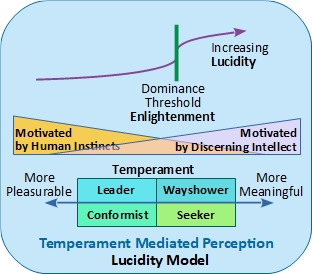
This subject is important to the study of perception because the way people mentally interact with their environment determines the choices they make and the kind of experiences they have.
Pleasurable or Meaningful – Following the lead of the Katha Upanishad, (21) the kind of choices people make tells us a lot about whether Mind 2 or Mind 1 is driving their decisions:
Pleasurable – People tend to be more comfortable doing things that promote the dominance of their gene pool. Human instincts turn people toward behavior that promotes their stature in the community.
Meaningful – The basic assumption of ancient wisdom schools is that individuals are intended to experience reality as it is and not as it is taught. Choices that lead a person to progress toward that understanding are considered meaningful in that they are made with the intention to gain understanding in preference to having pleasurable experiences that promote the gene pool. This is not to say pleasurable is bad. It is to say that sometimes truly beneficial experiences may not come from the more pleasurable choice.
Lucidity Spectrum – The Lucidity Spectrum concept began as an effort to identify why some people experience paranormal phenomena and others do not, or at least not as clearly. As it turns out, the current political environment and conspiracy theories (22) in the USA has provided ample opportunity to examine how people do or do not develop discernment. Virtually all of the analyses I have found point toward fundamental but poorly understood differences in temperament informing conservative or moderate choices.
Enlightenment Threshold — The Enlightenment Threshold on the spectrum represents the realization that we are more than our body. This is not an event so much as it is a phase change that begins the process of a person consciously questioning if what is perceived is actual. It is at the Enlightenment Threshold that an average person begins to realize that they are not their body and thus begin seeking to discover what that means.
Etheric Studies is a Third Way for Science
If we are asking how hard a falling rock will hit the ground, physical science is probably our best tool. If we are asking why people act as they do, psychology is probably our best tool. However, if we are asking how immortal personality interacts with the physical, neither is a good tool. Or more correctly, neither is a sufficiently complete tool.
The etheric can be described as a conceptual space while the physical is objective. The effect is that mental influence of physical space is a conceptual influence intended to change objective reality. The influence cannot be shielded from like we shield from light or sound. It occurs everywhere so that we cannot get far enough away from it to experimentally compare with and without experimenter or observer influence.
There appears to be no way for a scientist to ask a test subject to mentally cause a physical effect while being sure the scientist is not the one causing the effect. In Electronic Voice Phenomena (EVP), (16) not touching the audio recorder is not a way to assure only the practitioner is the conduit for the message. The conduit for a trans-etheric influence appears to be the practitioner or an interested observer … perhaps both.
While most scientists do not study things paranormal, those who do tend to make the basic assumption that phenomena are produced by the mind and that the mind is produced by the brain. The Psi Field Hypothesis treats mediumistic access of information as access to memory, either in the head of someone still in the physical or memory presumably stored in the Psi Field.
Right now, parapsychologists refer to the survival hypothesis as “…and some people think information comes from dead people” with no model for how this may be possible. One of our biggest problems in trying to lead the Association TransCommunication (ATransC) (23) has been convincing parapsychologists that they need to develop a more robust survival hypothesis which they would then consider for the analysis of experimental results.
We have not been successful, and in fact, have watched the anti-survival members of the parapsychological community become more dominant. For that reason, we have set out to do that job for them, beginning with the Trans-Survival Hypothesis (13) described in Your Immortal Self. (14)
Survival-Related Schools of Thought in Parapsychology
To communicate ideas, it is necessary to have a word that represents intended meaning. The first challenge is to teach the average paranormalist that not all parapsychologists are pro-survival. Here are what I have come to think of as the three primary categories of parapsychology:
Anomalistic Psychologists (17)
These are parapsychologists who accept that reality consists only of the physical universe. They study reported paranormal experiences to discover why people are either fooled by the ordinary which seems extraordinary (illusion or fraud) or are mentally delusional.
Exceptional Experiences Psychologists (18)
Parapsychologists who fit into this group accept that there is a Psi Field and that, while many experiences reported as paranormal are illusion, fraud or delusion, some may best be explained as Psi functioning (psychic).
This group thinks of survival as the person’s survived memory in the form of residual information somehow stored in the Psi Filed. Reported evidence of survival is attributed to information psychically accessed from the Psi Field or other people’s memory.
Survival Affirming Parapsychologists (19)
As noted, a small number of parapsychologists treat the Survival Hypothesis as a real possibility. Here, I need to make it clear that I am referring to survival of sentient consciousness (still alive but without a physical body), rather than just survived memory.
Etheric Studies
In the early days of my study of things paranormal, I asked members of the ATransC to suggest a name for who we were in the sense of people studying ITC. Commonly suggested terms included the meta- or trans- prefix, but each had a problem. The Trans- prefix works for the body-centric perspective. It is commonly used to describe etheric personality crossing the veil to talk to us. But we want to study that experience from the perspective of ordinary communication in which the veil is an artifact of our natural perceptual processes (the Worldview filter).
Meta- anything is just too abstract. Metaphysics is a term that fits our needs, but it is essentially owned by mainstream astronomy and philosophy. I differentiate my use of the term by referring to it as survival metaphysics. But, once again, survival implies body-centric.
I personally detest any term that includes reference to mind as psyche as that puts us right back into studying the mind as a product of brain. References to spirit have similar problems because of the New Age and religious baggage.
I finally decided on etheric as a once and still useful term for the greater reality. It is defined in Your Immortal Self. (15) as:
The study of all things etheric. This is not an individual science, such as biology or physics. It is a field of study concerned with the nature of the etheric aspects of reality. By comparison, physics and biology are sciences concerned with the physical aspect of reality and would be part of Physical Studies. The field of Etheric Studies is intended to complement physical science, as it is thought that discoveries in Etheric Studies will often extend the definition of physical principles while occasionally requiring the definition of new principles.
Scope of Etheric Studies
Emphases of the definition for Etheric Studies is on the idea that it is not a field of study or specialty such as biology is a specialty within physical science. As it is intended, Etheric Studies represents a global perspective of reality so that Physical Studies is a subset of Etheric Studies.
If the physical is an expression of mind, then it is necessary that physical sciences are treated as a subset of Etheric Studies. Magic is not allowed. Relationships in the etheric are considered reducible to their component concepts, functions and principles. Thirty-eight organizing principles (6) are listed in the Implicit Cosmology (7) to help the cosmology make sense. They are arranged as eight that seemed to best apply to reality such as collective, entanglement and fields, eleven that seemed to best apply to formation such as aspectation, attraction, continuity and process, and nineteen that seemed to best apply to personality such as attention, balance and curiosity.
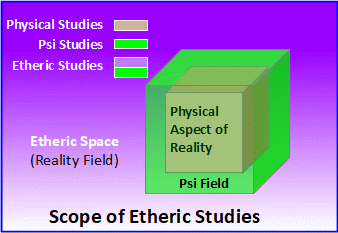
Who Studies the Etheric?
Anyone attempting to understand the nature of survival is, by definition, involved in Etheric Studies. A mental medium or a person working with ITC is an Etheric Studies practitioner. A person who studies these subjects is an Etheric Studies researcher.
A researcher may be trained as a physicist or psychologist and specializing in Psi studies as a parapsychologist. When studying paranormal phenomena such as the relationship between the medium and the etheric communicator, the researcher is working in the field of Etheric Studies.
Consciousness Studies
The underlying assumption of parapsychologists has always been that Psi-related phenomena is aberrant psychological behavior. Parapsychology is and has always been the domain of psychologists. Yet, many characteristics of Psi phenomena involves a combination of mental, biological, physical and behavioral characteristics of reality. It has become evident that progress in understanding these phenomena is hindered by parapsychologist’s insistence on forcing explanations of the phenomena to conform to psychological principles.
The overarching characteristic of Etheric Studies is the study of consciousness. While etheric is very abstract, consciousness seems to be a more approachable focus. As I have evolved my understanding of these phenomena and the community focused on them, it has become evident that, as it is currently conducted, the field of parapsychology is holding the community back from further understanding. My recommendation is that the community reinvent itself under the banner of consciousness studies.
According to Encycopedia.com, (24) Consciousness Studies “Consciousness studies is a new, rapidly evolving, highly interdisciplinary field that includes psychology, philosophy, physics, sociology, religion, dynamic systems, mathematics, computer science, neuroscience, art, biology, cognitive science, anthropology, and linguistics.”
An important objective of changing the emphasis from psychology to consciousness studies would be to dismantle the “good ol’ boy club” that has so destructively produced the Academic-Layperson Partition. (25)
Potentially Useful Papers
Especially useful papers on atrans.org and ethericstudies.org:
ATransC White Paper on Transcommunication
A brief overview of what is currently known by the ATransC Directors about ITC with an emphasis on EVP. It is written by Tom Butler and published by AA-EVP Publishing.
An explanation of the model being considered by the ATransC to help study EVP. The model is based on lessons learned from instrumental and personal forms of mediumship, theories related to Psi functioning and mainstream emerging understanding of the relationship between unconscious and conscious mind.
This essay is about concepts, points of view and their implications related to the study of things paranormal. My focus is on rules of evidence for the Survival Hypothesis. Remember that this is the world according to Tom. Qualified parapsychologists might have a rather different view. If so, readers need to remember to examine their qualifications.
Open Letter to Survival Researchers
An effort to provide “preemptive” feedback to BICS administrators concerning what I think we can expect from parapsychologists. Consider it a companion piece for the paper “Rules of Evidence – Survival.” It originated as an informal email to BICS. That was to be the last of my effort on the subject, but since there has been no acknowledgment from BICS that they received it, it seems reasonable to post it as an open letter on my website. While it was intended for BICS, it applies to all research and theory building related to the Survival Hypothesis and Psi phenomena.
Case for the Survival Hypothesis
This is a Bigelow Institute for Consciousness Studies (BICS) essay answering the question: “What is the best available evidence for the Survival of Human Consciousness after Permanent Bodily Death?” This essay presents an engineer’s view of the Survival Hypothesis based on evidence provided by mainstream and parapsychological science addressing consciousness, and lessons learned from the study of ITC.
Open Letter to Paranormalists: Limits of science, trust and responsibility
A letter to members of the paranormalist community discussing lessons learned, as Co-Director of the ATransC, about science, scientists and research. The letter includes a brief discussion identifying paranormalists, dominant theories about the nature of paranormal phenomena and important considerations for their study. The intent is to advise paranormalists about the need for discernment concerning the intention of those who would study these phenomena.
Two-Mind Solution to the Survival Hypothesis
The Survival Hypothesis holds that the mind aspect of who we are continues after bodily death. The two contending versions are the survival of memory is commonly referred to as the Super-Psi Hypothesis. What I think of as the Strict Survival Hypothesis holds that our mind continues to exist after bodily death in a self-aware, sentient form.
In the context of this paper, seekers are people who have the sense of being more than their physical body and who make a conscious effort to understand what that means. Seekers often describe themselves as a spiritual being having a physical experience. A seeker’s progression is sometimes thought of as increasing discerning intellect leading to greater lucidity. While greater discernment is thought to represent personal improvement, greater lucidity is thought to be a prerequisite for more conscious Psi functioning.
References
1. Shepard, Leslie; Spence, Lewis; Fodor, Nandor; Gale Research Company. Encyclopedia of Occultism & Parapsychology. ISBN-13: 978-0810385702. 1991. worldcat.org/title/23357285
2. Wordweb Dictionary. Princeton University, wordweb.info/
3. Butler, Tom. “Etheric Fields.” Etheric Studies. ethericstudies.org/etheric-fields/.
4. Butler, Tom. “Reality.” Etheric Studies. ethericstudies.org/reality/.
5. Butler, Tom. “Life Field.” Etheric Studies. ethericstudies.org/life-field/.
6. Butler, Tom. “Organizing Principles.” Etheric Studies. ethericstudies.org/organizing-principles/.
7. Butler, Tom. “Implicit Cosmology.” Etheric Studies. ethericstudies.org/implicit-cosmology/.
8. Mastin, L. The Basics of Philosophy. 2009. philosophybasics.com/branch_dualism.html.
9. Butler, Tom. “Avatar.” Etheric Studies. 2018. ethericstudies.org/avatar/.
10. Sheldrake, Rupert PhD. “Morphic Resonance and Morphic Fields.” Rupert Sheldrake. sheldrake.org/research/morphic-resonance/introduction?
11. Butler, Tom. “Morphic Fields.” Etheric Studies. 2018. ethericstudies.org/morphic-fields/.
12. Butler, Tom. “Conditional Freewill.” Etheric Studies. org/conditional-freewill/.
13. Butler, Tom. “The Mindful Way.” Etheric Studies. ethericstudies.org/mindfulness/.
14. Butler, Tom. “Trans-Survival Hypothesis.” Etheric Studies. ethericstudies.org/trans-survival-hypothesis/.
15. Butler, Tom. Your Immortal Self, Exploring the Mindful Way. AA-EVP Publishing, 2016. ISBN 978-0-9727493-8-1.
16. Butler, Tom. “A Model For EVP.” Association TransCommunication. 2017. atransc.org/model-for-evp/
17. “What is Anomalistic Psychology?” Goldsmiths, University of London. 2015. gold.ac.uk/apru/what/.
18. Simmonds-Moore, Christine. “What is Exceptional Psychology?” 76 supplement, Pages 54-57, Journal of Parapsychology, 2012.
19. Sudduth, Michael. “Super-Psi and the Survivalist Interpretation of Mediumship.” Cup of Nirvana. michaelsudduth.com/wp-content/uploads/2016/01/SurvivalMediumship.pdf.
20. Parapsychological Association. parapsych.org/.
21. (Translator) Panoli, Vidyavachaspati V. Katha Upanishad. Vedanta Shastras Library. shastras.com/upanishads-krishna-yajur-veda/katha-upanishad/.
22. Moskalenko, Sophia. “Many QAnon followers report having mental health diagnoses.” Neuroscience News. 2021. neurosciencenews.com/mental-health-qanon-18124/.
23. Butler, Alisa; Butler, Tom. “About the Association TransCommunication.” Association TransCommunication. atransc.org/about-atransc/
24. “Consciousness Studies.” Encyclopedia.com. encyclopedia.com/education/encyclopedias-almanacs-transcripts-and-maps/consciousness-studies
25. Butler, Tom. “Etheric Studies Glossary of Terms.” Etheric Studies. ethericstudies.org/glossary-of-terms
![]()

